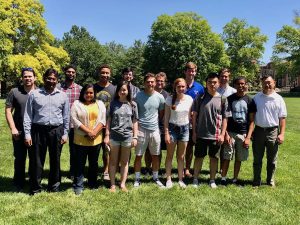
July 18, 2019
Mizzou Engineer leads regional research computing effort
A team of seven experts from universities across the region — led by Mizzou Engineering’s Timothy Middelkoop — recently received $1.4 million from the National Science Foundation to both meet regional research computing needs and provide workforce development to fill an emerging need in high-performance research computing. Many colleges and universities across the Midwest need comprehensive assistance with building or improving their cyberinfrastructure, but may not know exactly what they need or where to start. A team of seven experts from universities across the region — led by Mizzou Engineering’s Timothy Middelkoop — recently received $1.4 million from the National…

July 16, 2019
Mizzou Engineering’s Chadha protecting your data, identity
While hacking databases is the main way for interested parties to gain users’ personal information, it’s not the only possibility. Intrepid attackers can use perfectly benign means to do so. How? By using readily available aggregate data — for example: census data, medical data focused on how many people in an area suffer from a specific illness, consumer trend data, etc. — and using it to focus on specific individuals.

Jan. 22, 2019
Defense using pretense: MU Engineering team sets new cybersecurity paradigm
Instead of simply reacting to cyberattacks after they happen, Mizzou Engineering researchers developed a new approach — cyber “defense using pretense.”

Jan. 22, 2019
Studying behavior could lead to sustainability solutions
At first blush, Damon Hall’s office looks somewhat out of place. Tucked in the Natural Resources Building, his shelves are lined with the kind of reading material seemingly more suited for psychology or sociology. Looks, however, can be deceiving.

Aug. 14, 2018
EECS summer programs shed light on cyber security, machine learning
The Electrical Engineering and Computer Science Department had another busy summer, hosting research-focused college students from around the country at its National Science Foundation-funded Research Experience for Undergraduates: Undergraduate Research in Consumer Networking Technologies and several high school students as part of its Summers@Mizzou Hacker Trackers program.
Aug. 21, 2017
Hacker Trackers camp teaches high schoolers cyber security skills
Electrical Engineering and Computer Science Assistant Professor Prasad Calyam and his graduate students Roshan Neupane and Ronny Bazan Antequera organized the third-annual Hacker Trackers summer camp, held in July as part of the University of Missouri Extension’s Summers@Mizzou program. Calyam organizes the camp as part of his community outreach and STEM Education activities to attract high school students to get excited about MU Engineering and the computer science field in general.
- « Previous
- 1
- …
- 73
- 74
- 75
- 76